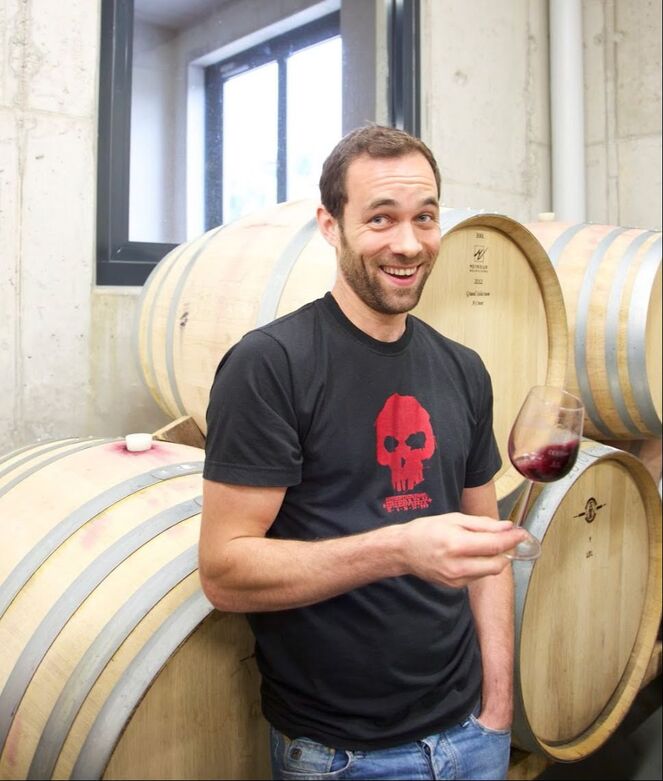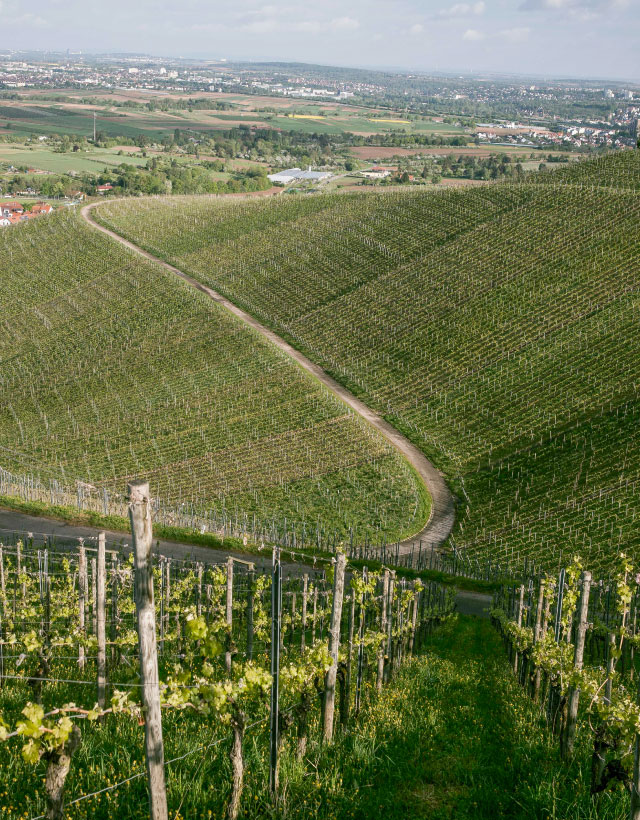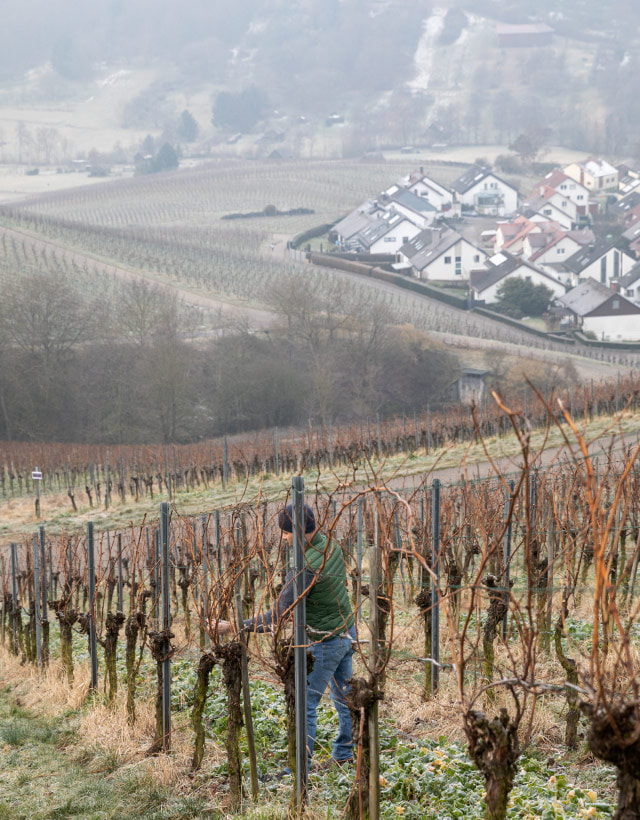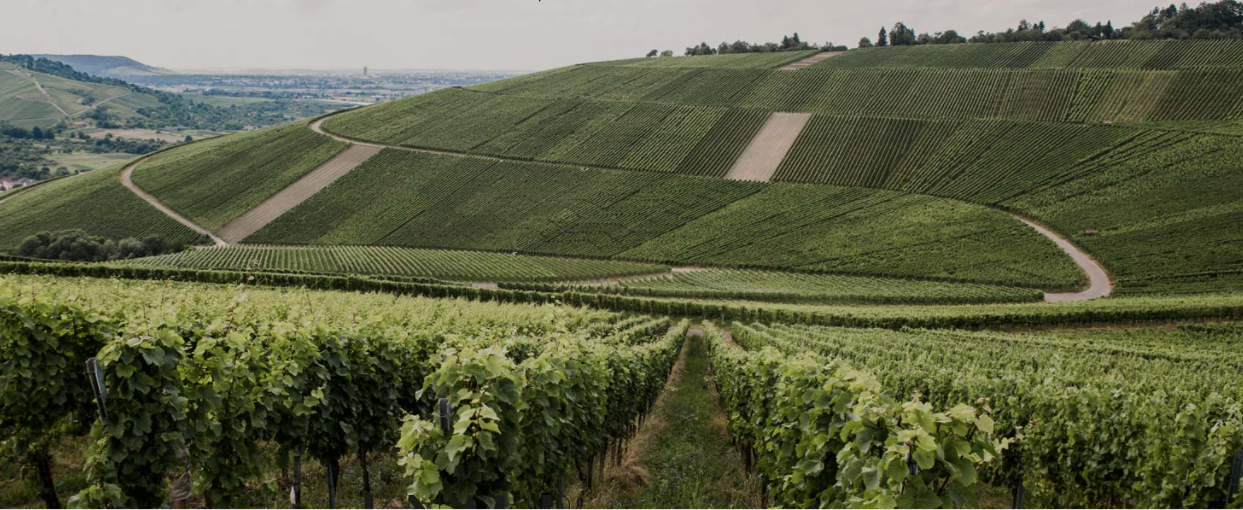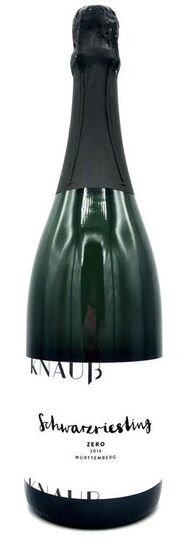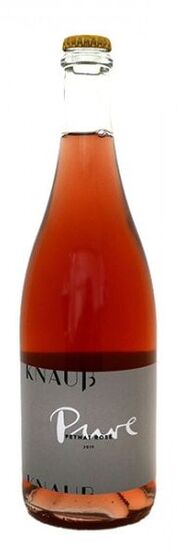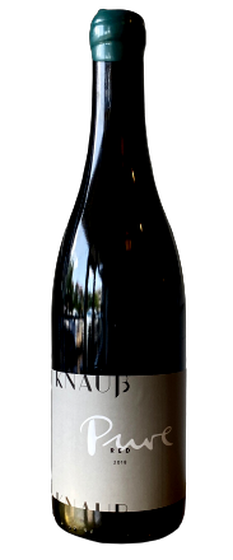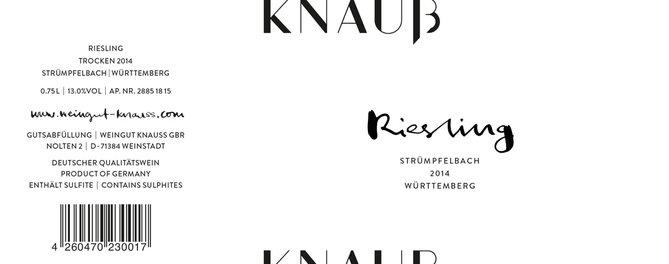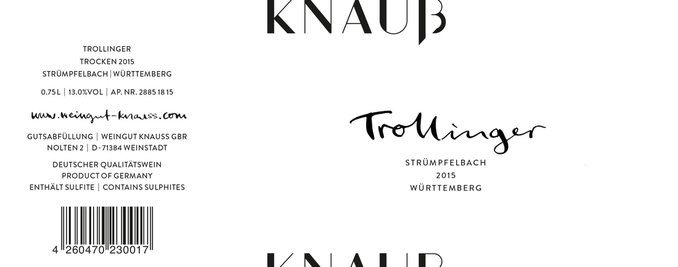Andi Knauss, Strumpfelbach, Württemberg
Appellation: Wurttemberg-Remstal
Grapes: Riesling, Chardonnay, Sauvignon Blanc, Kerner, Muller Thurgau, Trollinger, Lemberger, Pinot
Noir, Merlot.
Size: 14hectares
Production: 75000
Viticulture: Organic, Certified
Terroir: Gipskeuper.Mergel, Schilfsandstein, Kieselsandstein, Stubensandstein
Grapes: Riesling, Chardonnay, Sauvignon Blanc, Kerner, Muller Thurgau, Trollinger, Lemberger, Pinot
Noir, Merlot.
Size: 14hectares
Production: 75000
Viticulture: Organic, Certified
Terroir: Gipskeuper.Mergel, Schilfsandstein, Kieselsandstein, Stubensandstein
Whereas winemaking was a hobby for earlier generations at this domain (a way of winding down after a day's work at the nearby
Mercedes-Benz factory), Andi Knauss has long known he wanted to be a vigneron. After wine school and a stage in Austria (where
Andi learned how to work organically in the vineyard, and to care for the soil) he took over the reins at Weingut Knauss in 2004, and
in less than 10 years, he has developed one of the most important and exciting estates we know of. The vineyards are worked naturally,
and winemaking is careful and conscientious. Natural fermentation and minimal sulfur are the norms throughout the range, and some cuvees see no sulfur at all.
Andi, who is in his early thirties, runs a tight ship, making wine from over a hundred different plots in Strümpfelbach, the village where the winery is located, and a few surrounding villages in the hills around the river Rems. These hills are composed of different types of limestone of different eras, basically layered on top of each other, changing with the altitude, between 300 and 400 meters above sea level. Vineyard land here is expensive, but Andi has slowly built up the estate parcel by parcel, sometimes just a row, selecting the best
sites to be blended into the "Selection" and "Reserve" bottlings.
After working with us for a couple years, Andi decided to try his hand at a few experiments, making some wines that he wanted to make, but that he wasn't sure the German market was ready for. So far these include a sparkling wine with no dosage, and Trollinger "Without all," a with no sulfur, yeast, sugars or any other additives of any shape or form (Andi even eschews adding a front label). Other goodies are on the way, including a sparkling blanc de noirs from a fine plot of Pinot Meunier (or, as it is known locally, Schwarzriesling). We are very proud of these wines (not least because it turned out that Germans do have a taste for more natural wines) and couldn't be happier with the way things have turned out.
All of the Rieslings are grown on very alkaline soils with a variety of kinds of limestone to the fore. These yield a very distinct flavor profile: firm, racy wines that have historically always been fermented dry, and which are based on a mineral core with cool fruit and a firm snap of limey acidity in the finish. This is Swabian Riesling, and it is more akin to Chablis than the apple juice that is most folks' default idea of Riesling from Germany.
Mercedes-Benz factory), Andi Knauss has long known he wanted to be a vigneron. After wine school and a stage in Austria (where
Andi learned how to work organically in the vineyard, and to care for the soil) he took over the reins at Weingut Knauss in 2004, and
in less than 10 years, he has developed one of the most important and exciting estates we know of. The vineyards are worked naturally,
and winemaking is careful and conscientious. Natural fermentation and minimal sulfur are the norms throughout the range, and some cuvees see no sulfur at all.
Andi, who is in his early thirties, runs a tight ship, making wine from over a hundred different plots in Strümpfelbach, the village where the winery is located, and a few surrounding villages in the hills around the river Rems. These hills are composed of different types of limestone of different eras, basically layered on top of each other, changing with the altitude, between 300 and 400 meters above sea level. Vineyard land here is expensive, but Andi has slowly built up the estate parcel by parcel, sometimes just a row, selecting the best
sites to be blended into the "Selection" and "Reserve" bottlings.
After working with us for a couple years, Andi decided to try his hand at a few experiments, making some wines that he wanted to make, but that he wasn't sure the German market was ready for. So far these include a sparkling wine with no dosage, and Trollinger "Without all," a with no sulfur, yeast, sugars or any other additives of any shape or form (Andi even eschews adding a front label). Other goodies are on the way, including a sparkling blanc de noirs from a fine plot of Pinot Meunier (or, as it is known locally, Schwarzriesling). We are very proud of these wines (not least because it turned out that Germans do have a taste for more natural wines) and couldn't be happier with the way things have turned out.
All of the Rieslings are grown on very alkaline soils with a variety of kinds of limestone to the fore. These yield a very distinct flavor profile: firm, racy wines that have historically always been fermented dry, and which are based on a mineral core with cool fruit and a firm snap of limey acidity in the finish. This is Swabian Riesling, and it is more akin to Chablis than the apple juice that is most folks' default idea of Riesling from Germany.

